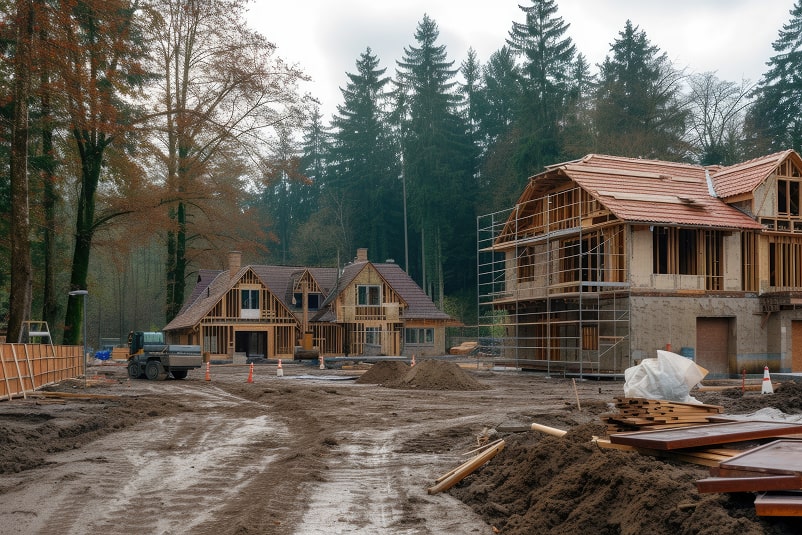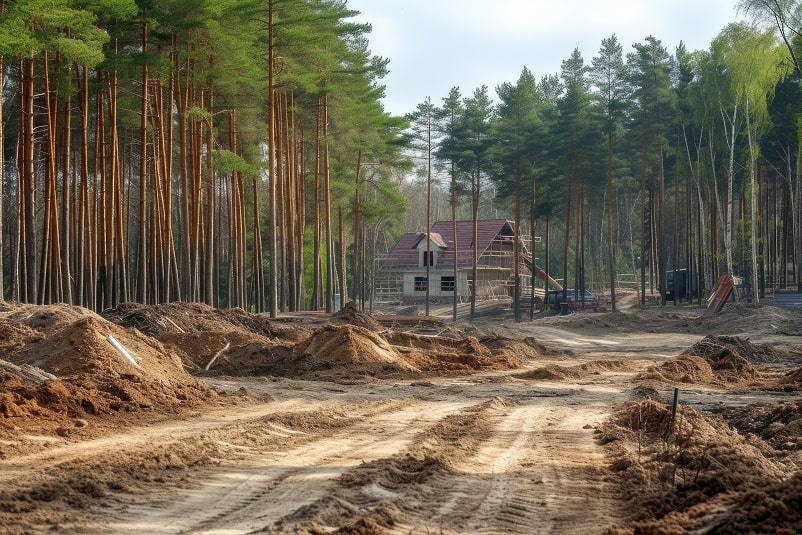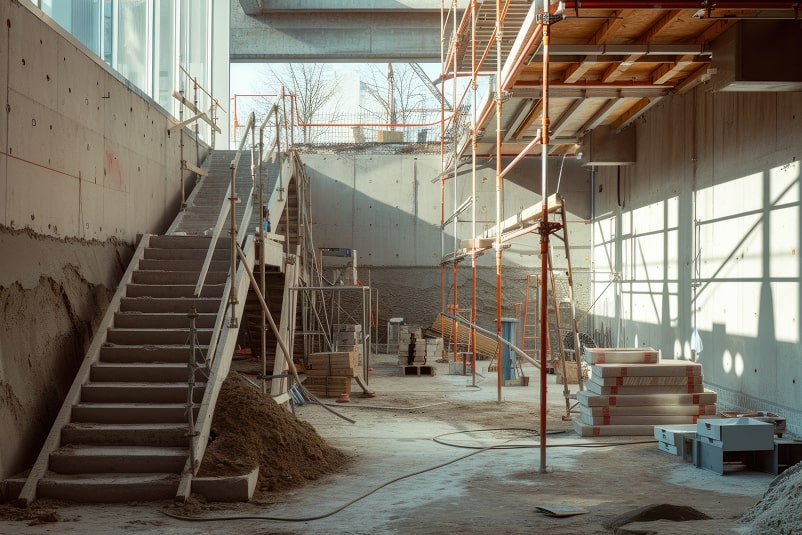Introduction to Self Build Mortgages
Self build mortgages for those who dream of building their own home from the ground up, turning their vision of a dream home into reality, a self-build mortgage is a powerful and tailored financial solution. Whether you’re an experienced property developer or a first-time self builder hoping to design a bespoke home. Self-build mortgages are also available to first time buyers, provided they meet the lender’s eligibility requirements. Understanding how self-build mortgages work and how they differ from traditional mortgages is essential.
In this article, we explore what a self-build mortgage is, when it’s the right product to use compared to similar options, who benefits most from this type of finance, what level of experience is typically required, and which lenders currently offer these products on the high street and via specialist channels.
What Is a Self-Build Mortgage?
A self-build mortgage is a type of property finance designed specifically for people building a new home from scratch. Unlike a traditional mortgage, where a lump sum is provided upfront upon completion of the property purchase, a self-build mortgage releases funds in stages as the construction progresses.
These funds are released as the build progresses, with funds released at key milestones to align with the completion of specific building phases.
This staged release structure helps reduce risk for the lender while giving the borrower the cash flow they need to fund each phase of the build from buying the land to laying foundations, and eventually fitting interiors and completing landscaping.
Most lenders structure these payments to ensure that releasing funds at each stage matches the actual progress of the build, which is crucial for managing both risk and cash flow.
Depending on the lender, there are typically two types of stage payments:
Arrears stage payments: Money is released after each stage of the build is completed and inspected.
Advance stage payments: Funds are released at the beginning of each stage, offering greater cash flow flexibility particularly useful for those without significant upfront capital.
Most lenders will have specific criteria for how and when stage payments are made, and the process of releasing funds is closely monitored as the build progresses to ensure each phase is completed before the next payment.
When comparing a self-build mortgage to other finance products, it’s important to consider that self build financing and loans may require the land to have at least outline planning permission to be eligible. Eligibility for these loans can depend on the type of self build mortgage product, the construction type, and whether the property will be energy efficient.
Costs associated with a self-build mortgage can include a valuation fee, which is typically required at different stages of the build to assess progress and value.
Eligibility for a self-build mortgage product or other mortgage product will depend on your personal circumstances, the construction type, and whether your project is designed to be energy efficient, as these factors can influence the lender’s decision and the terms offered.
If you plan to remortgage or switch products after the build is complete, be aware of early repayment and potential early repayment charges, which can affect your overall costs.
Interest rates for self-build mortgages known as self build mortgage rates may differ from standard products, often reflecting the additional risks and complexities involved in staged funding.
Benefits of Self-Build Mortgages
Choosing a self build mortgage offers a range of benefits for anyone embarking on a self build project. One of the standout advantages is the ability to design and construct your own home exactly as you envision it, tailoring every detail to your lifestyle and preferences.
Unlike traditional mortgages, a self build mortgage allows you to release funds in flexible stage payments as your build project progresses. This staged approach means you only pay interest on the loan amount you’ve drawn down, helping you manage project costs and keep the overall cost of your build mortgage under control.
Self builders also benefit from the flexibility that self build mortgages provide. Many build mortgage lenders offer competitive interest rates and the option to adjust stage payments to suit the unique timeline of your build. This can be especially helpful if your project encounters delays or changes.
With the support of experienced mortgage advisers, you can navigate the application process, compare build mortgages, and secure the best deal for your circumstances. Ultimately, a self build mortgage empowers you to manage your funds efficiently, adapt to the needs of your build, and turn your dream of owning a bespoke property into reality.
When Is a Self-Build Mortgage the Right Product?
A self-build mortgage is the right option when you’re:
Constructing a new residential property from the ground up, especially if you are planning self build properties, either for personal use or as an investment.
Purchasing land to build on, where the land may or may not already have planning permission.
In need of a funding structure that matches your build timeline, with staged releases aligned to your project milestones.
Looking to save on Stamp Duty, as this is only payable on the land value, not on the completed property.
Compared to other finance products:
Standard residential mortgage is only suitable for completed, habitable properties. It cannot be used for land purchases or during construction.
Bridging loan might offer flexibility and speed, but it is a short-term, higher-cost product not designed for long build times or owner-occupiers.
Development finance is better suited to large-scale or commercial projects and is often aimed at professional developers with multiple-unit projects or complex builds.
Refurbishment mortgages may be appropriate if you’re improving an existing property rather than building a new one.
Self-build mortgages bridge the gap by offering long-term affordability, customisation for private homes, and funding aligned to the build process.
For guidance on choosing the right mortgage product for your needs, speak directly to a mortgage adviser or broker.
Who Would Benefit from a Self-Build Mortgage?
Self-build mortgages are well-suited to a wide range of applicants:
Individuals and Families Building a Bespoke Home: Those who want to design and construct a unique property, often on a rural plot or as part of a small development, benefit from the flexibility and affordability that self-build mortgages offer. Building societies are among the providers offering these specialized mortgage products.
Experienced Property Developers: Developers looking to construct single units or add unique properties to their portfolio can use self-build mortgages and other loans to manage cash flow and control project phases.
Landowners Seeking to Build for Personal or Commercial Use: If you already own land or are purchasing land with planning permission, a self-build mortgage gives you the structure and capital to convert that asset into a finished home.
Custom Build Project Participants: Those taking part in community led or government backed custom build schemes may also qualify, especially if they are involved in group construction projects or plot-based building initiatives.
What Experience Is Required?
Experience requirements vary based on the complexity of the build and the lender’s risk appetite. Lenders also assess the construction type, as different construction methods or project types can influence mortgage terms, interest rates, and eligibility criteria.
Additionally, personal circumstances such as your financial situation and level of involvement in the build can impact your eligibility and the lending requirements.
Many lenders accept first-time self-build applicants, especially if they have appointed a qualified architect, project manager, or main contractor to oversee the works. A clear, detailed plan supported by professionals often compensates for a lack of personal experience.
That said, borrowers with prior self-build or development experience may find it easier to:
Secure higher loan-to-value (LTV) ratios
Access more competitive interest rates
Receive approval for larger or more complex builds
For any applicant, the following will significantly support an application:
Detailed building plans and architectural drawings
Proof of full planning permission and building regulations compliance
A fixed-price contract or clearly itemised costings
An exit strategy (e.g. moving into the property, selling, or refinancing)
Planning and Preparation
Successful self build projects start with thorough planning and preparation. Before applying for a self build mortgage, it’s essential to secure planning permission for your chosen plot and develop detailed plans for your new home. Careful budgeting is crucial consider all build costs, including land purchase, materials, labour, and a contingency for unexpected costs that may arise during construction.
Researching the different types of self build mortgages available is also key. Compare interest rates, product fees, and repayment terms from various build mortgage lenders to find the best fit for your project.
How Does a Self-Build Mortgage Work?
Self-build mortgages are typically structured around a series of staged payments tied to key project milestones. As the build progresses, funds are released at each stage, with lenders usually requiring evidence that the relevant phase has been completed before releasing the next payment. The exact stages may vary by lender, but a common model includes:
Land purchase
Foundations and groundwork
Wall plate level
Roof completed (wind and watertight)
First fix (electrics/plumbing)
Second fix (plastering/interiors)
Final completion
At the final stage, a completion certificate is typically required to confirm the build is finished according to the approved plans, allowing the lender to release the final funds.
Lenders may release funds in arrears or advance, depending on the product selected. During the build, borrowers often pay interest only on the drawn-down balance. Once the project is complete, the mortgage may convert into a standard residential repayment product.
How Much Deposit is Required?
When considering a self build mortgage, one of the first questions self builders ask is how much deposit they’ll need. Most self build mortgage lenders require a deposit of between 20% and 30% of the total build costs, though this can vary depending on the lender and your individual circumstances.
Some build mortgage lenders may accept deposits as low as 15%, while others especially for more complex or higher-risk projects might require up to 50%.
It’s important to factor your deposit into your overall financing plan, as the size of your deposit can affect the interest rates you’re offered and the range of self build mortgage products available to you.
Consulting with experienced mortgage advisers can help you determine the most suitable deposit amount for your situation and connect you with a build mortgage lender that matches your needs. Careful planning at this stage ensures you have the necessary funds in place to move your self build project forward with confidence.
High Street Lenders Offering Self-Build Mortgages
A few high street lenders still support self-build projects, though their criteria may be more restrictive and typically favour lower-risk applicants.
Lender | Type of Product | Max LTV | Notes |
|---|---|---|---|
TSB | Self-build mortgage | 75% | Staged payments, arrears-based |
Nationwide | Custom Build mortgage | 85% | In partnership with BuildStore |
Halifax | Self-build via intermediaries | 75% | Planning permission and building regs required |
Santander | Limited availability | 70% | May lend on completion via remortgage only |
Lloyds Bank | Self-build via group projects | 75% | Case-by-case basis, must be UK residents |
These lenders often work in partnership with intermediaries or specialists such as BuildStore to manage application vetting and stage release monitoring.
Specialist Lenders Offering Self-Build Finance
Specialist lenders are often more flexible in underwriting and are more comfortable with complex or bespoke projects. They cater to both residential owner-occupiers and semi-professional developers.
Lender | Payment Type | Max LTV | Key Features |
|---|---|---|---|
BuildStore | Advance & arrears | 85% | UK’s leading self-build specialist |
Ecology Building Society | Arrears | 80% | Focus on eco-friendly and sustainable homes |
The Mortgage Lender (TML) | Arrears | 75% | Flexible approach to income and self-employment |
Mansfield Building Society | Both | 80% | Accepts modern methods of construction |
Ipswich Building Society | Arrears | 80% | Regional lender with niche underwriting |
Bath Building Society | Arrears | 75% | Will consider complex or non-standard builds |
These lenders tend to have more relaxed criteria on things like property location, construction method (e.g., timber frame, SIPs), and self-employment history.
VAT and Tax Implications
Understanding the VAT and tax implications of your self build project is essential for effective budgeting and compliance. In the UK, self builders are often eligible to reclaim VAT on many building materials and services used in the construction of their own home, which can significantly reduce overall build costs.
However, strict rules apply, and it’s important to keep detailed records and submit your VAT reclaim within the required timeframe. Refer to the HMRC website for more details.
Beyond VAT, self builders should also consider other tax implications, such as capital gains tax if the property is sold, and stamp duty land tax on the land purchase. Each of these can impact the total cost of your build project.
Seeking expert advice from a tax specialist or accountant with experience in self build projects can help you navigate these complexities, ensure you claim all available reliefs, and avoid unexpected tax liabilities. By planning ahead, you can make the most of available tax benefits and keep your self build project on a solid financial footing.
What Happens After the Build?
Once the self-build is completed and signed off by Building Control, the mortgage typically transitions into a standard residential repayment product. The property’s value is reassessed based on completion, and in many cases, borrowers may:
Switch to a new lender for better rates (considering early repayment and the potential for early repayment charges when moving to a new mortgage product)
Capital raise against the improved value
Refinance into a long-term fixed-rate product
This stage is crucial, as your long-term affordability and mortgage rate will depend on the final valuation and loan-to-value ratio.
Is a Self-Build Mortgage Right for You?
If you’re planning to build your own home or undertake a one-off development project, a self-build mortgage offers the structure, flexibility, and staged funding to bring your vision to life. While not every lender offers this type of product, those that do can support a wide range of build types from traditional bricks and mortar to eco-friendly modular homes.
Securing the right finance for your self-build project requires expert planning, a clear build schedule, and a well-presented application. Working with a mortgage broker who understands the self-build process can help you navigate lender criteria, stage payments, and ensure your project stays on track from land purchase to final sign-off.
Get help from an experienced mortgage broker
You can speak to one of our specialist mortgage brokers who would be able to guide you through the process. They will advise if there is a lender available and the maximum loan amount based on your circumstances. We are a whole of market mortgage brokerage with access to all lenders. Call us on 01332 470400 or complete the form with your details for us to give you a call back.
Why Work with Option Finance for Commercial Mortgages?
At Option Finance, we specialise in mortgages for complex credit scenarios. Our team works with all major bad credit lenders and has access to exclusive deals that aren’t available on the high street.
Understanding one’s credit report from a credit reference agency can help in securing a mortgage.
Over 20 years of experience
Full market access to specialist lenders
Fast, honest, and personalised mortgage advice
Expert help with complex or recent credit issues
Showing our favourite reviews

Always attentive, helpful and efficient
Jonathan, 27 Jan 2025

Best Mortgage Broker in the UK!
Liam, 26 Nov 2024

Ben was really helpful in helping me…
George, 28 Aug 2024
FAQs
What is a self-build mortgage?
A self-build mortgage is a type of loan designed to help fund the construction of your own home, rather than purchasing a pre-built property. The funds are released in stages, aligning with key phases of the build (e.g. foundations, roofing, completion).
How does a self-build mortgage work?
Unlike traditional mortgages, self-build mortgages release money in instalments either in advance or in arrears based on the progress of the build. This helps manage cash flow during construction and ensures funds are used as intended.
Do I need planning permission before applying?
Yes, most lenders will require detailed planning permission, building regulations approval, and often a build cost breakdown before offering a mortgage. Without this, the application can’t proceed.
How much can I borrow with a self-build mortgage?
Lenders typically offer up to 75–85% of the land and build costs, though this varies. You’ll usually need to provide a deposit of at least 15–25%, and more if the land is already owned.
Can I live in the property during construction?
No, you generally can’t live in the property until the build is complete and certified. Many self-build mortgage lenders also require that you don’t live in temporary structures (like caravans) on-site due to safety and insurance concerns.
Ready to Take the First Step?
Whether you’re a first-time buyer, remortgaging, or moving home, bad credit doesn’t have to hold you back.
Understanding credit scoring can help you prepare for a mortgage application. You can speak to one of our specialist mortgage brokers who would be able to guide you through the process. They will advise if there is a lender available and the maximum loan amount based on your circumstances. We are a whole of market mortgage brokerage with access to all lenders.
































